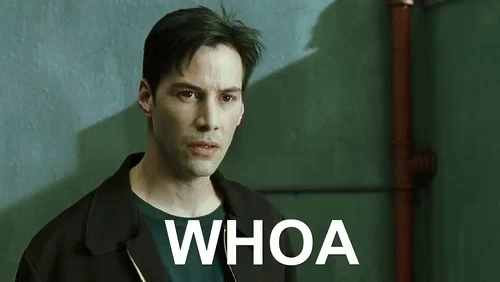I still think that Neo influencing the real world is more augmented reality. He is able to manipulate code, so anything using machine code can be affected by him. Similar to how Flynn was able to affect the world of Tron with his user level access. Just now all the technology of the world is generated by the code, he still sees it the way the machines do.
Yeah that’s basically what it is… the way I see it is that what happens to Neo after visiting the Architect is that he basically gains “admin access”, plus wifi capability… I’m guessing every plugged human has that wifi capability anyways, because of how things are set up in the movie:
Throughout the movies, they keep mentioning having to get “into broadcast range” in order to hack into the Matrix (which is actually why they even go out of Zion in hover crafts in the first place, instead of just doing the whole thing from the comfort of their living rooms in Zion), which implies that the machines have a comunication relay network, which they not only use to relay information between each other, like sentinels relaying info and orders between them and the machine city, but also the matrix is part of that network and is being broadcast too… in fact the matrix program seems to be a lot more integral to the machine world than they let on… it might even be their whole operating system (which might be why the machine boss agrees to Neo’s deal, instead of just hard formatting the matrix servers and get rid of the Smith virus that way)… plus we see that agents within the matrix can relay information to sentinels in the real world directly, so that also points out to the matrix being used for a lot more that just a self-contained simulation.
Anyhow, the point is, in the movie we see the humans plug into chairs in their ships to get into the matrix, which is why we assume that you need to physically plug into the matrix, but the ships don’t use a cable connection, the ships have a wireless signal receiver, so the chairs and the ship are more like a router: Ship gets into bradcast range and connect to the signal, the operator hacks into the matrix, then everyone else can plug into the ship’s system to take advantage of that hack, instead of having to hack individually into the matrix.
After Reloaded, Neo is able to bypass that whole process and connect to the machines’ signal directly and remotely (they all have a modem inserted into their brain after all, it’s just that Neo unlocks the ability to use it to its full extent), and since he’s already a hacker, and the anomaly with special user access and knowledge, he can basically hack into the Matrix AND into whatever other comunications the machines use, that’s why he ends up beaming his consciousness remotely into the train station, and that’s why he can “sense” the machines in the real world.
Thus I don’t think he’s using super powers to destroy them, but rather he’s hacking directly into the sentinels in the real world to shut them down at the end of Reloaded, and then to make them self-destruct in Revolutions… and his golden vision is just a visualization of how he “senses” the machines.
So like I said, they don’t explicitly explain anything, but there are plot elements sprinkled throughout which allow us to connect the dots… I’m guessing they left it vague so people could interpret it either way, because in the end, the important thing is not “how” he can do it but “what” he can do… But then again, I might be wrong too 
1 user thanked author for this post.



